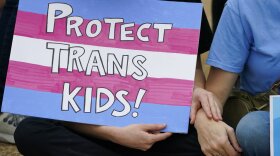
Esta Pratt-Kielley
Digital News Reporterepratt-kielley@mainepublic.org
Esta Pratt-Kielley is a digital news reporter at Maine Public, where she writes and produces multimedia stories, seeking to bring Maine Public’s storytelling to life across platforms.
Before moving to Maine, Esta lived and worked in New York City. She wrote and produced daily news for MSNBC’s Andrea Mitchell Reports, covering national politics, the 2020 election, racial justice protests and the coronavirus pandemic. Before that, Esta reported national education stories for NBC News, where she produced short documentaries and educational video series, helped launch a Webby award-winning parenting website, wrote and produced episodes for a daily news show for kids, and traveled across the country to produce live-audience broadcasts in partnership with local NBC affiliate stations. In October 2019, Esta was the senior producer for a televised, live-audience event in Detroit, Michigan, that put a spotlight on the city’s education system.
Esta is originally from Madison, Wisconsin, where she attended the University of Wisconsin-Madison and graduated with a Journalism degree and a Fine Arts minor. Esta’s career in journalism began at her college radio station, where she reported daily newscasts and hosted a weekly talk show.
Esta lives with her wife, their baby, and two rescue dogs. They spend most weekends outdoors, hiking or swimming.
-
Maine hospitals may be forced to abandon gender-affirming care for youth, per proposed federal rulesGender-affirming care for minors is currently legal in Maine, but surgeries for minors are incredibly rare. The proposed rules are expected to face legal challenges. A 60-day public comment period begins on Friday.
-
The Maine Office of the Secretary of State says they received several complaints from voters and municipalities about aggressive behavior by groups petitioning for a citizen’s initiative at the polls on Tuesday.
-
A conservative group that wants to restrict transgender students' access to sports and school bathrooms is circulating a petition at polling places in Maine on Tuesday. If they collect enough signatures, the measure could be on next year's ballot.
-
The Wabanaki Alliance has come out in opposition to Question 1 on November’s ballot, warning that the Wabanaki nations would be harmed by changes to absentee voting and its exclusion of tribal IDs as a valid form of voter identification.
-
The Trump administration has taken aim at diversity, equity and inclusion efforts, and the effects are being felt by tribal communities that are grappling with issues such as violence against indigenous women. Now some Wabanaki women are turning to each other to learn to protect themselves.
-
The laws include establishing a PFAS response program, the first of its kind in the nation; helping to prevent student homelessness; allowing doctors to keep their names off of prescription labels for abortion medication; and tax incentives and protections for residents of mobile home communities.
-
3,000 Mainers called the LGBTQ+ hotline last year, according to the Trevor Project. Maine advocates say the elimination of this specialized service puts already vulnerable kids at risk. But they say there are still resources for LGBTQ+ youth to find support.
-
Spring and summer are a busy time of year for Maine florists who typically rely on imported cut flowers to make arrangements for weddings, funerals and other special occasions. But President Trump’s ever-changing tariffs may start to disrupt that. Local flower growers could be the beneficiaries, if they can keep their own costs down.
-
The Supreme Court's decision has no effect on Maine, which currently has no bans restricting access to gender-affirming care for minors.
-
Advocates say the bill is a “civil rights victory” for people with disabilities in Maine.











